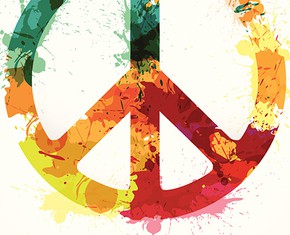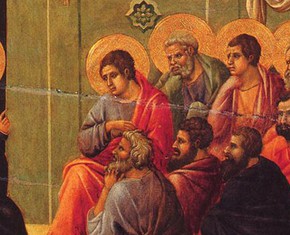The views expressed in our content reflect individual perspectives and do not represent the authoritative views of the Baha'i Faith.
The people who live down the street are Hindu. These days Hindus live down everyone’s street—if you go far enough.
The ancient religion of India and the subcontinent has hundreds of millions of followers around the world—so shouldn’t we make an effort to get to know these gentle souls? After all, the Baha’i writings encourage everyone to “Consort with the followers of all religions in a spirit of friendliness and fellowship.”
If we have all been brought together at the end of an age and the beginning of a new one, as the previous essays in this series have asserted; and if the rivers of religion have now emptied into a common ocean, as the Baha’i teachings say, then we in the West must learn to see our Hindu neighbors not as foreign, but as part of the human family and as part of an ancient divine plan.
To do that, it will help us to understand some basic Hindu beliefs. The kind of loving, harmonious interaction that understanding will bring about will also help Hindus understand that while ancient beliefs have brought us to this point in history, we all live in a new reality, and there is much for us all to learn.
Let’s start with preparing for a hypothetical visit to your Hindu neighbor’s home. To begin with, while they probably accept the religious designation “Hindus,” this is somewhat like calling the followers of American religions “Mississippians.” The word “Hindu” is a Westernization of the river Sindhu, a word Persians and Greeks originally mispronounced, and this mispronunciation eventually became “Hindu” in English.
The word India, by the way, also has its root in the land around the Indus Valley, but the country we know as India also has another constitutionally validated name, Bharat. “Bha” means light or splendor in Sanskrit and “rata” means “delighting in” or “devoted to.” It’s a great name for a country, and it reveals a lot of the special character of its people, as well—devoted to the light. The word Bharat can be found in the oldest of the Hindu scriptures, the Rig Veda, where it is the name of a king (sometimes also called Bharata)—identified as an early unifier of India.

Hindus often call their own religion Santana Dharma—the eternal teaching—and indeed, there are many eternal truths found in it. Many Hindus regard Krishna as the founder of Santana Dharma, but others will often say there is no human founder of their faith—that it is timeless and ageless. In this way, Hindus often cleverly regard the teachings of all religions as different expressions of Hinduism—as long as they are consonant with their religion’s eternal moral principles.
There are, of course, many different religions in India, just as there are many different religions among the people on either side of the Mississippi. India has Parsis, Sikhs, Jains, Jews, Muslims, and Baha’is a-plenty, but the majority, some 800 million people, are Hindus.
What we call Hinduism is no longer a single religion—it’s a network of related religious communities held together by a vast system of ancient myths, stories, and understandings arising from a massive sacred literature from which Hindus sample and differentially emphasize.
Polytheists or Monotheists?
Before we set foot in a Hindu home, it’s best to get clear on some fundamentals. Chief among them: Are they polytheists or monotheists? The answer may be a bewildering: “Yes.” Some Hindus bow (or sit) before different idols they call Gods (both upper and lower case “g” is used), while others do not. Thus, some Hindus seem to be polytheists while others are monotheists. The trouble is, the boundaries between polytheism and monotheism, especially in India, are subtler than we may think.
Hindus believe in the Vedas (the word means “knowledge”), an enormous collection of scripture divided into four parts: The Rig Veda, Yajur Veda, Sama Veda, and Atharva Veda. Because of the Vedas, Hinduism is considered a revealed religion, meaning that its scriptures record what sages (rishis) heard God say. Hindus consider the Vedas “sruti”: what was heard from or revealed by God.
Other Hindu texts are smriti, or remembered, and are secondary to sruti. Smriti literature includes the Itihasas (Sanskrit for “histories”) that include the famous epics the Ramayana and the Mahabharata, the latter of which contains the Bhagavad Gita—the best-known piece of Hindu sacred literature. The Smriti also contains the Puranas (Sanskrit for “of ancient times”), which are massive collections of stories and allegories including histories of the universe and genealogies. The smriti also includes the Manu-smriti (Laws of Manu). Manu is the first created man in Hinduism and, according to some etymologies, the probable origin of the English word “man.” Manu was the progenitor of the human race and also saved his children from a flood by building a boat—the parallel with Noah is obvious.
In fact, you can find parallels from many subsequent Faiths in Hindu scripture, especially the universal religious law of love. The Yajur Veda says:
“The one who loves all intensely begins perceiving in all living beings a part of himself. He becomes a lover of all, a part and parcel of the Universal Joy. He flows with the stream of happiness, and is enriched by each soul.”
While he was in Paris in the early part of the 20th century, Abdu’l-Baha spoke with a Hindu man who told him: “My aim in life is to transmit as far as in me lies the message of Krishna to the world.” Abdu’l-Baha said:
The Message of Krishna is the message of love. All God’s prophets have brought the message of love. None has ever thought that war and hate are good. Every one agrees in saying that love and kindness are best.
You May Also Like
Comments

















I feel a little uncomfortable with the suggestion that "often cleverly regard the teachings of all religions as different expressions of Hinduism".
As I understand it each religion is an expression of a universal spiritual reality S pervasive as the laws of physics which has accompanied the evolution of human civilization, become made known through these successive Revelations and becoming the foundation of and progenitor of the advance of human civilization until a fresh Revelation was required. It would be easy to show parallels between these different traditions of Faith, but in reality ...they are revealed expressions of the same underlying spiritual truth.